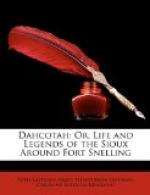Will it be said that I am regarding, with partial eye and sentimental romance, but one side of the Sioux character? Have they no faults, as a people and individually? They are savages—and that goes far to answer the question. Perhaps the best answer is, the women have faults enough, and the men twice as many as the women. But if to be a savage is to be cruel, vindictive, ferocious—dare we say that to be a civilized man necessarily implies freedom from these traits?
Want of truth, and habitual dishonesty in little things, are prevalent traits among the Sioux. Most of them will take a kitchen spoon or fork, if they have a chance—and they think it fair thus to return the peculations of the whites. They probably have an idea of making up for the low price at which their lands have been valued, by maintaining a constant system of petty thefts—or perhaps they consider kitchen utensils as curiosities, just as the whites do their mocassins and necklaces of bear’s claws. Yes—it must be confessed, however unsentimental, they almost all steal.
The men think it undignified for them to steal, so they send their wives thus unlawfully to procure what they want—and wo be to them if they are found out. The husband would shame and beat his wife for doing what he certainly would have beaten her for refusing to do. As regards the honesty of the men, I give you the opinion of the husband of Checkered Cloud, who was an excellent Indian. “Every Sioux;” said he, “will steal if he need, and there be a chance. The best Indian that ever lived, has stolen. I myself once stole some powder.”
I have thus, perhaps tediously, endeavored to show, that what is said in this work has been learned by intimate association, and that for years, with the Indian. This association has continued under influences that secured unreservedly their confidence, friendship—and I may say—truly, in many instances—their affection. If the perusal of the Legends give pleasure to my friends—how happy am I! To do more than this I hardly dare hope.
M. H. E.
PRELIMINARY REMARKS
ON
The customs of the Dahcotahs.
I.
Sioux ceremonies, scalp dance, &c.
The Sioux occupy a country from the Mississippi river to some point west of the Missouri, and from the Chippewa tribe on the north, to the Winnebago on the south; the whole extent being about nine hundred miles long by four hundred in breadth.
Dahcotah is the proper name of this once powerful tribe of Indians. The term Sioux is not recognized, except among those who live near the whites. It is said to have been given by the old French traders, that the Dahcotahs might not know when they were the subjects of conversation. The exact meaning of the word has never been ascertained.




